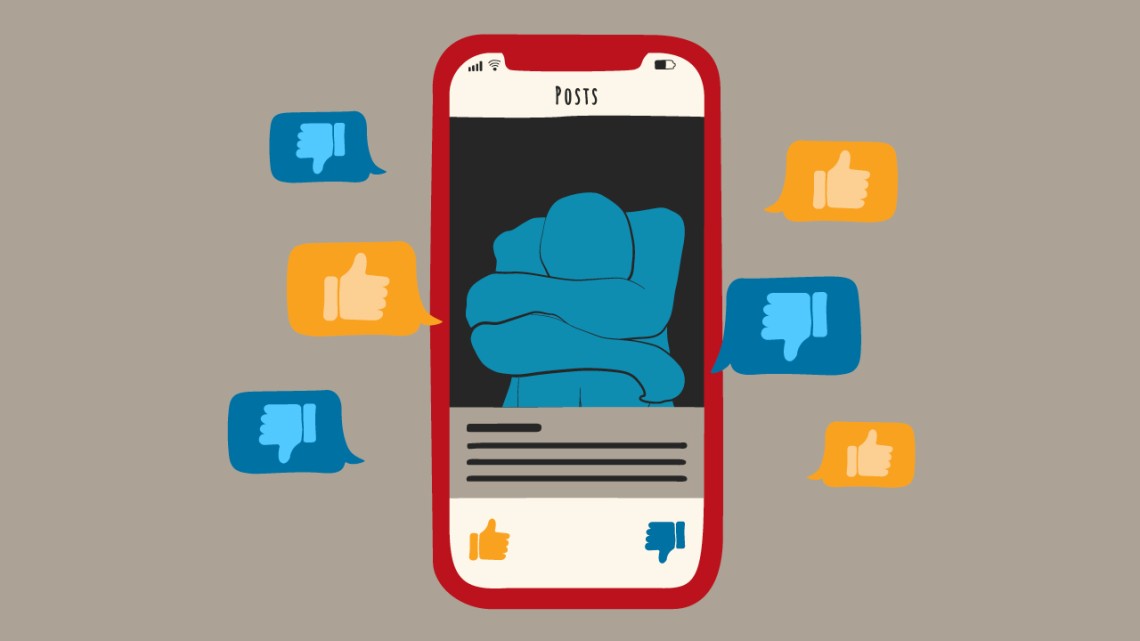
Influencers’ vulnerabilities are a double-edged sword
By Tom Fleischman, Cornell Chronicle
The old adage states, “If you can’t stand the heat, get out of the kitchen.” But what if work in a kitchen pays the bills?
This seems an apt comparison for the struggles of social media influencers – a sub-sector of a swelling economy of “creators” who earn income by posting on platforms like Instagram, TikTok, YouTube or Twitch. While they are encouraged to reveal their innermost selves to their legions of followers – both by the platforms companies, and by metrics that reward a creator for “putting yourself out there” – doing so can open them up to identity-based harassment.
“Creators share deeply personal – often vulnerable – elements of their lives with followers and the wider public,” said Brooke Erin Duffy, associate professor of communication in the College of Agriculture and Life Sciences. “Such disclosures are a key way that influencers build intimacy with audiences and form communities. There’s a pervasive sense that internet users clamor for less polished, less idealized, more relatable moments – especially since the pandemic.”
Duffy is the lead author of “The Politics of Vulnerability in the Influencer Economy” published Dec. 29 in the European Journal of Cultural Studies, in a special issue devoted to “Freelance Feminism.” Her co-authors are Anuli Ononye ’22, who just completed her M.Phil. degree at the University of Cambridge, and Megan Sawey, a Cornell doctoral candidate in the field of communication.
The research team conducted in-depth interviews with content creators to get a sense of how they experience the demands to make their content – and often themselves – visible to audiences, sponsors and the platforms.
Among their findings:
- The value of vulnerability for platform-based influencers cannot be overstated – authenticity sells, and that means projecting intimacies, insecurities, and even secrets;
- These authentic revelations are often tied to one’s identities, which can open a person up to attacks based on gender, race, sexuality and other perceived traits;
- Personal and social vulnerabilities were often compounded by the vulnerabilities of platform-dependent labor: Not only did participants identify the failures of their platforms to protect them from harm (as “contractors” instead of “employees”), many felt these companies incentivize networked antagonism.
“Influencers and creators have relatively few formal sources of support or protection,” Duffy said. “In contrast to those legally employed by Meta, Twitch and TikTok, creators are independent contractors. They’re left wanting for a lot of the workplace protections traditionally afforded to employees.”
The interviewees – most of them women, people of color or members of other historically marginalized groups – expressed the same view that visibility is necessary for success. They also agreed that to attain that visibility, projecting personal – and seemingly vulnerable – elements of their lives resonated with audiences. One content creator shared her autism diagnosis; another shared her experience of losing her mother at a young age.
One of the gaming influencers they interviewed expressed her frustration with being a woman in a space dominated by men. “(Y)ou are very, very much harassed,” she said. “Like, ‘Oh, go back in the kitchen. Make a sandwich. What are you doing on this platform?’”
The researchers examined informal strategies – both anticipatory and reactive – that creators deploy to manage their vulnerabilities. The former included the use of platform filtering systems to sift out abusive, profane or hurtful language. The latter strategies ranged from simply not reading the comments to employing the platform’s tools to minimize the impact of what, for many, felt like an inevitable onslaught of critique.
The authors acknowledge the difficulties of resolving endemic issues of internet hate and harassment. “‘Getting off the internet’ is hardly a viable option for participants in the put-yourself-out-there neoliberal job economy,” they wrote – and offer a warning to those wishing to join the creator economy.
“It is something of a truism that ‘everyone gets the same platform,’” they wrote. “We would caution, however, that the politics of visibility – and hence, the politics of vulnerability – are far less egalitarian that platforms lead us to believe.”
Media Contact
Get Cornell news delivered right to your inbox.
Subscribe
